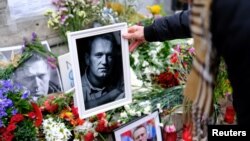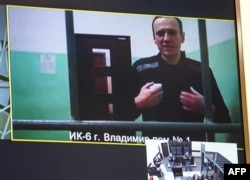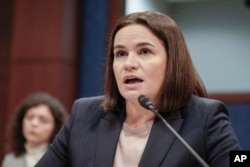Shortly before his death in an Arctic penal colony on February 16, Russian opposition politician Alexey Navalny was set to be exchanged for a Russian prisoner in Germany, spokeswoman Maria Pevchikh said in a video statement Monday, an allegation shared by Navalny's family and supporters.
"Alexey Navalny could be sitting in this seat right now, right today. That's not a figure of speech, it could and should have happened," said Pevchikh in the statement posted to YouTube.
Pevchikh said she had confirmation that talks for a swap were in their "final state" on February 15, the day before Navalny was reported dead.
"Navalny should have been out in the next few days because we got a decision about his exchange,” said Pevchikh, who lives outside Russia.
She alleged that Navalny was killed a day later because Russian President Vladimir Putin could not tolerate the thought of him being free and decided to "get rid of the bargaining chip."
Pevchikh did not present evidence or disclose sources for her assertions.
The Kremlin has denied allegations by Russian opposition figures, the United States and Europe that Navalny was killed by the Russian state, describing them as unacceptable. Navalny's death certificate states that he died of natural causes, according to his supporters.
Alleged swap for FSB hit man
According to Pevchikh, Navalny and two U.S. citizens held in Russia were supposed to be swapped for Vadim Krasikov, a Russian FSB security service hit man serving a life sentence in Germany for the 2019 killing in Berlin of Zelimkhan "Tornike" Khangoshvili, a 40-year-old Georgian citizen of Chechen descent.
German judges said Krasikov acted on the orders of Russian authorities, who gave him a false identity, passport, and resources to carry out the killing.
Pevchikh said that businessman Roman Abramovich was involved in some of the talks with Putin as a mediator. There was no immediate comment from Abramovich.
Pevchikh did not identify the U.S. citizens that were supposedly part of the deal. There are several in custody in Russia, including Wall Street Journal reporter Evan Gershkovich, who was arrested on espionage charges, and Paul Whelan, a corporate security executive from Michigan, convicted of espionage and serving a long prison sentence. They and the U.S. government dispute the charges against them.
Asked at news conference in Berlin to comment on Pevchikh's allegations, German government spokesperson Christiane Hoffmann said she couldn't comment.
Earlier this month, in a TV interview with Putin, U.S. journalist Tucker Carlson asked about prospects of exchanging Gershkovich, and Putin said the Kremlin was open to negotiations, referring to a man imprisoned in a "U.S.-allied country" for "liquidating a bandit," who allegedly killed Russian soldiers during separatist fighting in Chechnya. Putin didn't mention names but his words appeared to describe Krasikov.
Putin has not commented on Navalny's death and made no mention of a swap to release Navalny.
Navalny's body
The late opposition politician's body was handed over to his mother in the Arctic city of Salekhard on Saturday. The arrangements for his burial have not been announced but his supporters are looking for a venue where they can publicly bid him farewell, Navalny spokesperson Kyra Yarmysh wrote on the X social network.
Yarmysh said the event, which is separate from a funeral, could take place by end of the work week.
Yarmysh said Friday that Russian authorities had given his 69-year-old mother Lyudmila Navalnaya an ultimatum: Agree within three hours to lay him to rest without a public funeral or he would be buried at the prison.
Speaking to reporters earlier Monday, Kremlin spokesman Dmitry Peskov called allegations that Russian authorities pressured Navalnaya over her son's funeral absurd, saying Putin was not involved in decisions on Navalny's body.
"I can't comment in any way because the Kremlin has nothing to do with this, so the Kremlin cannot exert pressure. This is another absurd statement by these [Navalny] supporters," he said.
"They are almost all wanted [by the Russian authorities] and almost all of them are abroad. Their statements should be treated accordingly," he added.
Pevchikh said that since the start of the Ukraine war, Navalny's supporters had made serious efforts to get him out of Russia as part of a prisoner exchange involving "Russian spies in exchange for political prisoners."
She alleged that they even approached the late Henry Kissinger but said Western governments had failed to show the necessary political will.
"Officials, American and German, nodded their heads in understanding. They recounted how important it was to help Navalny and political prisoners, they shook hands, made promises and did nothing," she said.
Exiled Belarusian opposition leader Sviatlana Tsikhanouskaya warned on Monday that the death of the Russian activist could be perceived as a "green light" for authoritarian countries to kill other political prisoners.
Tsikhanouskaya's husband Siarhei, a video blogger critical of the authorities, was arrested in May 2020 after announcing his intention to run against Belarusian President Aleksandr Lukashenko.
His family has stopped receiving any news about him.
"In the last year, he has been kept in incommunicado mode," Tsikhanouskaya told Reuters on the sidelines of the United Nations Human Rights Council in Geneva.
Sanctions
The United States on Friday imposed extensive sanctions against Russia, targeting more than 500 people and entities to mark the second anniversary of Russia's war against Ukraine and to retaliate for Navalny's death.
Kremlin spokesman Peskov shrugged off the latest round of Western sanctions against Moscow saying Russia's economy had adapted to restrictions and that those sanctions were causing indirect harm to European economies and U.S. companies.
The International Monetary Fund expects Russia's economy to grow 2.6% this year, but anticipates tough times ahead. The Bank of Russia forecasts 2024 economic growth at 1-2%.
Some information is from The Associated Press, Agence France-Presse and Reuters.









